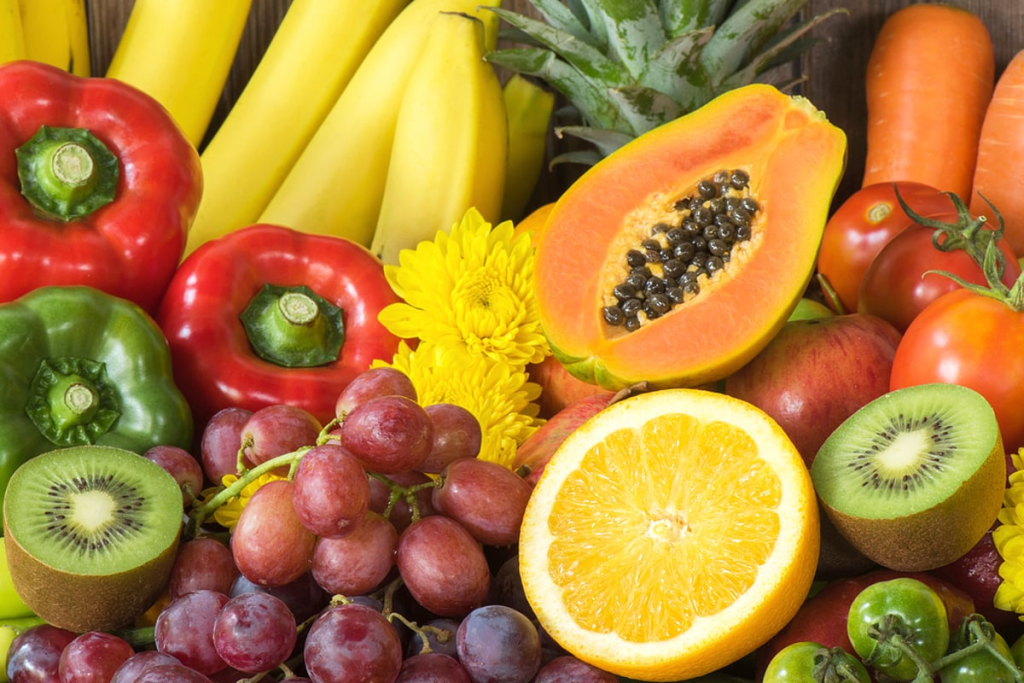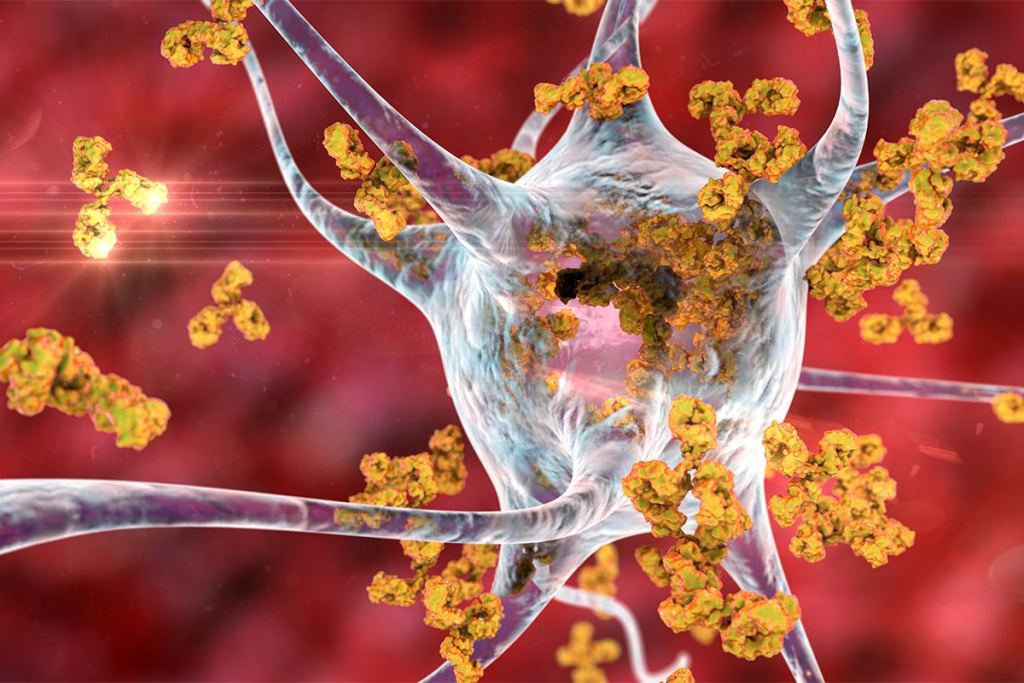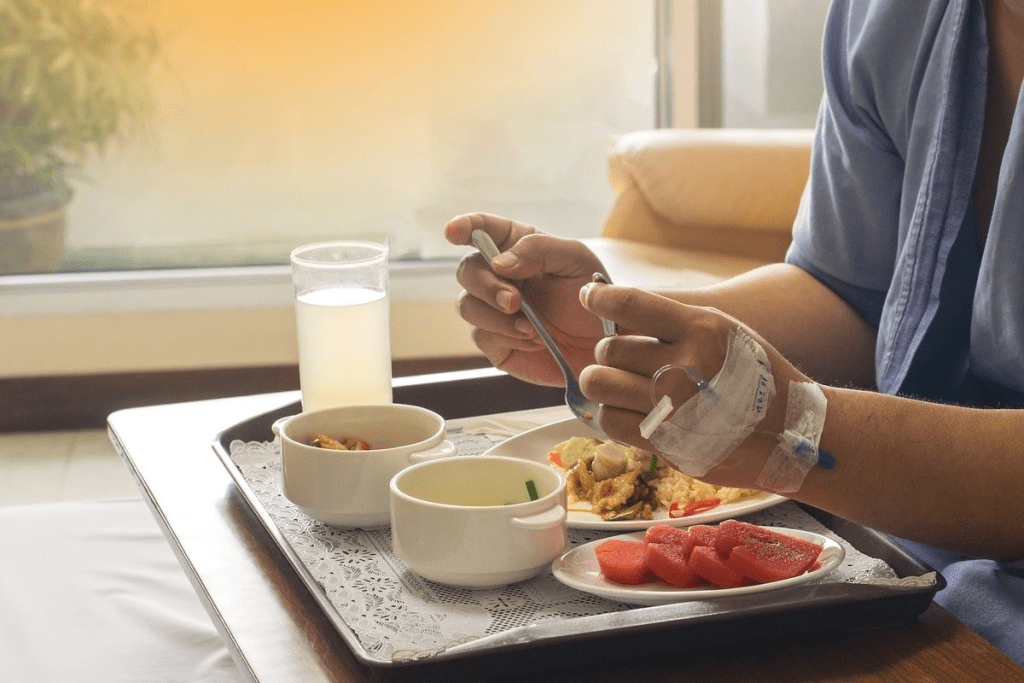Last Updated on November 13, 2025 by
Chemotherapy is tough, and eating right is key. We tell patients to watch what they eat, including fresh fruits. This is because chemo weakens the immune system.

Chemo makes patients more likely to get sick from bacteria and fungi in raw fruits. Fruits that can’t be peeled are extra risky for those with weak immune systems. We create safe diets at top hospitals to help patients through this. Why can’t you eat fruit on chemo? See the foods to avoid while on chemo and the dangerous rules for fruit consumption. Crucial low-microbe diet guide.
Understanding the right diet during chemotherapy is key for cancer patients.
It’s key to know how chemotherapy impacts the immune system for those getting treatment. Chemotherapy targets fast-growing cells, like cancer cells. But, it also hits other fast-growing cells in the body, including immune cells.

Chemotherapy lowers the immune system by reducing white blood cells. These cells are essential for fighting off infections. This can lead to neutropenia, where the body has fewer neutrophils, making it easier to get sick.
The impact on the immune system is significant. Chemotherapy not only lowers the number of white blood cells but also weakens their function. This means patients are not only more likely to get sick but also have a tougher time getting better.
People on chemotherapy are more likely to catch infections because their immune systems are weak. It’s vital for these patients to be cautious and take steps to avoid germs. They should eat safely, avoiding raw or undercooked foods that could have harmful bacteria or viruses.
Knowing how chemotherapy affects the immune system helps patients and caregivers make better choices. This knowledge lets them make informed decisions about their care, including what they eat. This can help support their immune system during treatment.
A well-planned diet is key in supporting the body during chemotherapy. It makes treatment more effective. Understanding how diet affects health and treatment results is vital.

Nutrition is a key part of cancer care. It gives the body what it needs to handle chemotherapy. A balanced diet helps manage side effects, keeps strength up, and aids in recovery.
Proper nutrition can greatly improve life quality for those undergoing chemotherapy. It helps them better handle treatment and may lead to better results.
During chemotherapy, nutritional needs change. Patients may need more protein to repair tissues and keep the immune system strong. Some nutrients can also help with common side effects like nausea and fatigue. Knowing these needs is important for making good dietary choices.
The foods we eat during chemotherapy can affect treatment success. Some foods can change how well chemotherapy drugs work. For example, grapefruit and its juice can affect some chemotherapy medications. Foods high in antioxidants may protect healthy cells from damage.
Also, a diet full of essential nutrients boosts the immune system. This helps the body fight off infections and may lower the chance of treatment delays or dose cuts. By choosing foods wisely, patients can support their health and treatment success.
Knowing the foods to avoid while on chemo is vital for patient safety. When you’re on chemotherapy, some foods can be very harmful. Chemo weakens your immune system. This makes you more likely to get sick from bad food.
Some fruits can have harmful germs or fungi. This is a big risk for people on chemo. Berry fruits, grapes, and melons are extra careful because they can get contaminated easily.
It’s not just fruits that are risky. Other foods can also be dangerous. You should avoid raw or undercooked meats, unpasteurized dairy products, and raw eggs to lower infection risk.
By being careful with these foods, chemo patients can lower their infection risk. This helps support their health during treatment.
For patients on chemotherapy, fresh fruits are both good and bad. They are nutritious but can also carry harmful germs. It’s important to know the risks of eating fresh fruits while fighting cancer.
Fresh fruits can have harmful bacteria like Salmonella and E. coli. They can also have fungi. This is a big risk for people whose immune systems are weak, like those on chemotherapy.
We must be careful where we get our fruits from. Even with good handling, there’s always a chance of germs. So, it’s key for those on chemotherapy to know these risks and take steps to stay safe.
Some germs are more dangerous on raw fruits. Listeria is one that can cause serious infections in people with weak immune systems. Other germs like Norovirus and Cyclospora can also be on fruits, making infections more likely.
To lower these risks, we suggest that those on chemotherapy avoid high-risk fruits or clean them very well. Knowing these risks helps make better choices about what to eat during chemotherapy.
Research shows that eating fruits during chemotherapy can have both good and bad effects. Fruits are usually good for us because of their nutrients. But, we need to think about some things to get the most benefits and avoid risks.
Recent studies have looked into how fruits affect chemotherapy results. They found that eating lots of fruits and veggies can help cancer patients live longer. For example, a study in the Journal of Clinical Oncology showed that eating more fruits and veggies can lead to better survival rates.
Key findings from recent reviews include:
Fruits can affect how well chemotherapy works and how likely cancer is to come back. Fruits like berries and citrus have antioxidants that can help with side effects. But, we must be careful about the risk of germs on raw fruits.
Some critical aspects to consider:
By knowing these things, patients and doctors can decide wisely about fruits in a chemotherapy diet. This helps balance the good and bad sides.
Fruits can be a great part of a chemotherapy diet if chosen and prepared right. Chemotherapy patients must be careful with their food to avoid infections and other problems. Fruits are nutritious but can be risky if not handled correctly.
To make fruits safer for chemotherapy patients, wash and peel them properly. Thorough washing can remove surface bacteria and other pathogens. Peeling fruits like apples and bananas can also help, as many pathogens live on the skin.
To wash fruits, use running water and gently scrub the surface with a clean brush. For fruits like grapes and berries, rinsing under running water is enough. Always wash your hands before handling fruits to prevent cross-contamination.
Cooking or processing fruits can kill harmful bacteria and viruses, making them safer for chemotherapy patients. Cooked fruits are as nutritious as raw fruits and can be used in many dishes, like pies, sauces, and compotes.
Examples of cooked and processed fruit products include applesauce, fruit jams, and canned fruits. These are not only safer but also convenient. Just make sure to check the labels for added sugars and preservatives.
By choosing the right fruits and preparation methods, chemotherapy patients can enjoy fruits’ nutritional benefits while reducing risks. Always talk to your healthcare provider for personalized dietary advice.
Many think all fruits are bad for people on chemotherapy. This belief can cause them to miss out on important nutrients. Let’s look at the truth about eating fruits during chemotherapy.
Some believe all fruits are risky for those on chemotherapy because of contamination. But, not all fruits are the same. Fruits that are washed, peeled, or cooked well can be safe and healthy.
Another myth is that you should not eat fruits during chemotherapy. But fruits are full of vitamins, minerals, and antioxidants. Not eating fruits can cause a lack of nutrients, which might harm treatment results.
Studies show some fruits are good for people on chemotherapy. For example, berries and citrus fruits have antioxidants that help fight oxidative stress. Also, fruits with lots of fiber can help with digestion, which often gets worse during treatment.
To safely eat fruits, patients should handle and prepare them right. This means washing them well, peeling when you can, and avoiding moldy or damaged fruits. Cooking or processing fruits can also kill harmful germs.
Knowing the facts and being careful can help patients get the good from fruits while avoiding risks. It’s key for those on chemotherapy to talk to their doctors or a dietitian. They can help make a diet plan that includes safe and healthy fruits.
A balanced diet during chemotherapy is more than avoiding certain foods. It’s about adding foods rich in nutrients to support health. Eating the right foods helps keep you strong and manage side effects.
It’s important to eat a variety of nutrient-dense foods during chemotherapy. Lean proteins like chicken, fish, and legumes help keep muscles strong and boost the immune system. Whole grains, such as brown rice and whole-wheat bread, offer fiber, vitamins, and minerals.
Vegetables, rich in antioxidants and fiber, should be a main part of your diet. Healthy fats in nuts, seeds, avocados, and olive oil are key for energy and vitamin absorption. Drinking plenty of water is also essential for staying hydrated.
Good meal planning is vital for a balanced diet during chemotherapy. Start with small, frequent meals to fight nausea and keep energy up. Eating a variety of foods ensures you get all the nutrients you need.
Preparing meals when you’re feeling good helps on tough days. Use nutrient-rich ingredients and simple recipes to make cooking easier. This way, you have healthy meals ready when you need them most.
By choosing nutrient-rich foods and planning meals wisely, patients can manage their diet during chemotherapy. This supports their health and may even improve treatment results.
Oncologists and hospitals suggest personalized diets for patients on chemotherapy. This helps reduce risks and boosts nutritional benefits. It’s key to keep strength up, manage side effects, and support health.
International guidelines stress the need for a balanced diet full of nutrients. Johns Hopkins Medicine suggests eating foods rich in protein, vitamins, and minerals.
They also advise against foods that could lead to infections or worsen side effects. For example, it’s best to avoid raw or undercooked foods. These can contain harmful bacteria or fungi.
It’s vital to work with healthcare pros to create a diet plan. Oncologists and dietitians offer advice tailored to each patient’s needs. They consider the patient’s condition, treatment, and nutritional needs.
By teaming up with healthcare experts, patients can make a diet plan. This plan helps manage side effects and supports health during and after chemotherapy.
It’s very important for patients on chemotherapy to balance their diet. We’ve looked at how food and treatment interact. Making smart food choices is key to staying safe and getting the nutrients you need.
Having a good chemo diet is vital for your health and treatment success. Avoiding high-risk foods and choosing nutrient-rich options helps. This way, patients can face the challenges of chemotherapy better.
Working with your healthcare team and eating a balanced diet is important. It helps you get the nutrients you need and lowers the risk of infections. This approach is essential for your health and well-being during treatment.
Chemotherapy weakens the immune system. This makes patients more likely to get infections. Some foods can increase this risk.
Fruits like berries, grapes, and apples can be contaminated. They are not properly washed or peeled. This poses a risk to patients.
Yes, they should also avoid undercooked meats, raw eggs, and unpasteurized dairy. These can have harmful pathogens.
They can safely eat fruits by washing and peeling them well. Or, they can choose cooked or processed fruit alternatives.
They should eat lean proteins, whole grains, and a variety of vegetables. This helps maintain strength and health during treatment.
They can work with healthcare professionals to create a diet plan. This plan should consider their specific needs and health status.
Some think all fruits are off-limits during chemotherapy. But, some fruits can be safely eaten with proper handling and preparation.
Hospitals and oncologists suggest working with healthcare professionals. They recommend a personalized diet plan that balances safety and nutrition.
There’s no single food for all side effects. But, a balanced diet with whole foods can support health. It can also reduce some side effects’ severity.
It’s not good to make unhealthy foods a main part of their diet. But, they can sometimes enjoy less healthy options. It’s key to focus on nutrient-dense foods for health.
A balanced diet supports treatment efficacy. It ensures the body gets necessary nutrients. This helps maintain strength and overall health during treatment.
Subscribe to our e-newsletter to stay informed about the latest innovations in the world of health and exclusive offers!